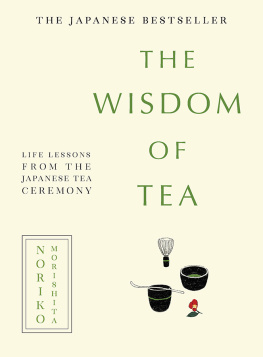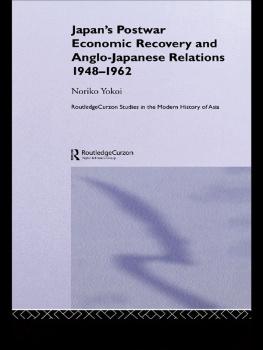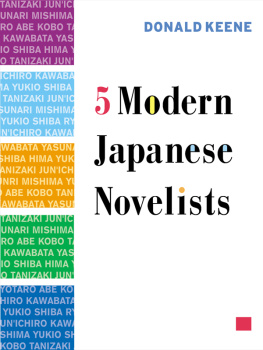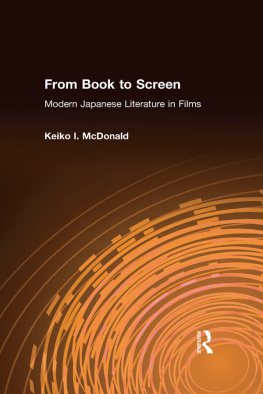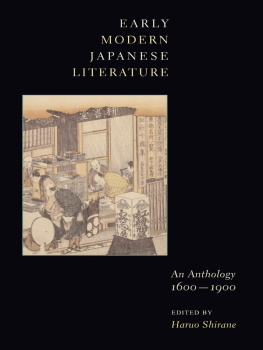Reality and Fiction in Modern Japanese Literature
Noriko Mizuta Lippit
First published 1980 by M.E. Sharpe
Reissued 2018 by Routledge
2 Park Square, Milton Park, Abingdon, Oxon OX14 4RN
711 Third Avenue, New York, NY 10017, USA
Routledge is an imprint of the Taylor & Francis Group, an informa business
Copyright 1980 by Taylor & Francis
No part of this book may be reprinted or reproduced or utilised in any form or by any electronic, mechanical, or other means, now known or hereafter invented, including photocopying and recording, or in any information storage or retrieval system, without permission in writing from the publishers.
Notices
No responsibility is assumed by the publisher for any injury and/or damage to persons or property as a matter of products liability, negligence or otherwise, or from any use of operation of any methods, products, instructions or ideas contained in the material herein.
Practitioners and researchers must always rely on their own experience and knowledge in evaluating and using any information, methods, compounds, or experiments described herein. In using such information or methods they should be mindful of their own safety and the safety of others, including parties for whom they have a professional responsibility.
Product or corporate names may be trademarks or registered trademarks, and are used only for identification and explanation without intent to infringe.
Publishers Note
The publisher has gone to great lengths to ensure the quality of this reprint but points out that some imperfections in the original copies may be apparent.
Disclaimer
The publisher has made every effort to trace copyright holders and welcomes correspondence from those they have been unable to contact.
A Library of Congress record exists under LC control number: 79067859
ISBN 13: 978-1-138-04510-1 (hbk)
ISBN 13: 978-1-315-17211-8 (ebk)
In memory of my Father, Mikio Mizuta
This study emerged during the years when, my sojourn in the United States having become longer than I had initially anticipated, my consciousness turned increasingly toward questioning and evaluating my own relation to Japan's literary heritage. For Japanese who have witnessed (at least intellectually) the violent attraction to and rejection of foreign cultures of many of their predecessors in the Meiji, Taisho and Showa eras, and their final, often sentimental and abstract, glorification of the Japanese cultural heritage, nihon kaiki (return to Japan) still presents enormously complex intellectual as well as emotional problems.
To view the long-held ambivalence of Japanese artists and writers the desire to be a member of the cosmopolitan artists' society and the desire to maintain a unique and closed world of their own only as the Japanese struggle over cultural identity, as many critics have done, will miss the most crucial element in shaping modern Japanese literature. For since the Meiji period, writers have been seriously concerned with the function of art and literature in the historical process of the formation of a society on the one hand and with the ethical function of art in the writers' personal lives on the other. Only in the Taisho period, when Tanizaki, for example, deliberately identified himself as an artisan of the pre-modern era, did writers and artists try vigorously to separate art from politics and morality, and themselves from intellectuals. Yet in both the Meiji and early Showa periods, writers struggled passionately with questions of politics and ethics, trying to relate themselves vitally to the complex reality of modern Japan.
Just as the I-novel, the most distinctive fictional genre in Japanese literature, must be understood in terms of the writers' attempt to deal with their isolation from social reality in the overly utilitarian Meiji era, the return to the Japanese heritage of such writers as Tanizaki, Kawabata and Mishima must be understood as a reaction against the preoccupation of their contemporaries with the relation between art and political and historical reality, and with the relation between art and morality, as well as in the context of the severe national control of art and literature. The works written by members of the ultra-nationalistic group Nihon Romanha (Japanese Romantic Group), many of whose members converted from Marxism, only clarifies the escapist elements of nihon kaiki . Although the present study is not an attempt at literary history, I have tried to maintain a perspective which regards the development of modern Japanese literature in relation to the Meiji goal of modernization and its consequences.
I am most indebted to Professor Shoichi Saeki, a literary critic and professor of comparative literature at the University of Tokyo, for illuminating my "return" passage to Japanese literature. Since the time I was his student in English and American literature at the graduate school of Tokyo Metropolitan University, he has been my unfailing mentor and a model for the most sensitive critical intelligence. I am also deeply indebted to Dominic Cheung, a poet and my colleague at the University of Southern California, for deepening my understanding of the importance of cultural tradition in writers' creative consciousness. I also learned much from co-teaching with him courses on the Asian aesthetic tradition, and this is reflected especially in the chapter on Akutagawa. Professor Roy E. Teele read the entire manuscript and made invaluable criticisms and suggestions. Professors Earl Miner, Jun Eto, Yoshio Iwamoto and Dominic Cheung read some of the chapters when they were to appear initially in several journals, and their criticisms proved indispensable in the final revisions of the manuscript. I would also like to express my gratitude to Tsukao Kawahigashi of Tokyo Metropolitan University for his assistance in preparing the manuscript for publication.
Above all, my warmest gratitude goes to Victor D. Lippit, whose devotion to our family made this study possible. Most of the chapters were written during the time when I watched in agony from six thousand miles away my father falling fatally ill and passing away. The book is dedicated to him.
Riverside, California
June 1979
In twentieth century Japanese literature, the opposition and interaction of realism and romanticism on the level of literary concepts, and of Marxism and aestheticism (including, in part, modernism) on the level of literary ideology, supplies a most vital basis for writers searching for new methods of literary expression, fostering debates among the writers and creating the setting for active experimentation with style, form and language. Cosmopolitanism and traditionalism were also vital cultural concerns for Japanese writers, whose exposure to Western culture and literature supplied a significant source of imagination and energy for their creative activities. Many Japanese writers who went through a period of active learning from the West, however, later turned to the cultural and literary heritage of Japan as their source of inspiration. Although their "return" was certainly influenced by Japan's nationalistic war effort and their feeling that the cultural tradition was threatened, at a much more basic level, it was the outcome of their vital concern with the relation of art to the self, reality, and the cultural tradition of Japan. This concern, underlying the aesthetic and ideological debates of the modern period, was shared by practically all writers and, as expressed in the major literary movements of the twentieth century, may indeed be regarded as the defining characteristic of modern Japanese literature.






